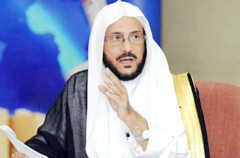
Manama: A member of Saudi Arabia’s Shura Council has reiterated her call to merge the Commission of the Promotion of Virtue and the Prevention of Vice with the Ministry of Islamic Affairs following the appointment of a new minister.
“Following the appointment of Abdul Lateef Al Shaikh as Minister of Islamic Affairs, the right man for the right position, I believe it is time to apply the recommendation that fellow Shura Member Ata Al Subaiti and I had submitted, through the merger of the Commission of the Promotion of Virtue and the Prevention of Vice with the Ministry of Islamic Affairs,” Lateefa Al Shaalan posted on her Twitter account.
On Saturday, Al Shaikh, the former head of the commission known for his pro-reform stances, was given the powerful portfolio as part of a limited cabinet reshuffle that focused on culture, labour, religion and natural reserves.
In the recommendation presented two years ago, Al Shaalan and Al Subaiti said the merger would avoid the duplicity of work since both the ministry and the commission were promoting virtue within society.
They also argued that the merger would serve streamline public work, especially that the commission employed around 8,000 people.
However, following heated debates, the recommendation was not passed by the Shura Council.
The appointment of Al Shaikh who headed the commission from 2012 and 2015 is today seen as a positive step towards strengthening the fight against extremist ideologies using religion as a façade.
Throughout his tenure at the commission, he had to deal with ultraconservative forces that stalled his attempts to reform the authority often known as the “religious police.”
In 2015, Al Shaikh admitted in a television interview that the Muslim Brotherhood had a powerful say within the commission and that several members were totally opposed to any type of reform, Saudi daily Okaz reported on Sunday.
Al Shaikh was behind the attempt to prevent members of the commission from chasing suspects in vehicles and which at times resulted in fatalities. He also banned “religious assistants” from engaging in any field work as they did not have an official capacity.
Assistants had often taken the liberty to ban any form of music in public, to abuse women verbally or to stand against cultural events they deemed offensive.










